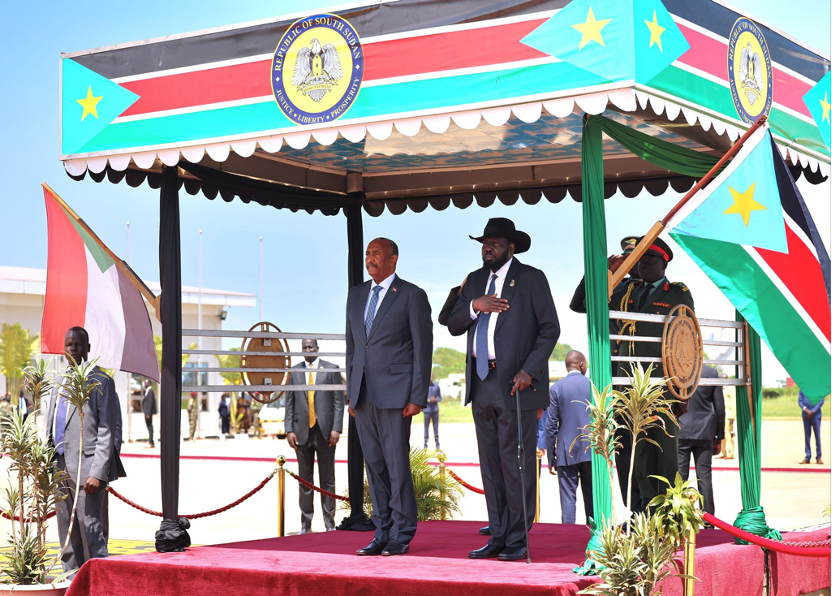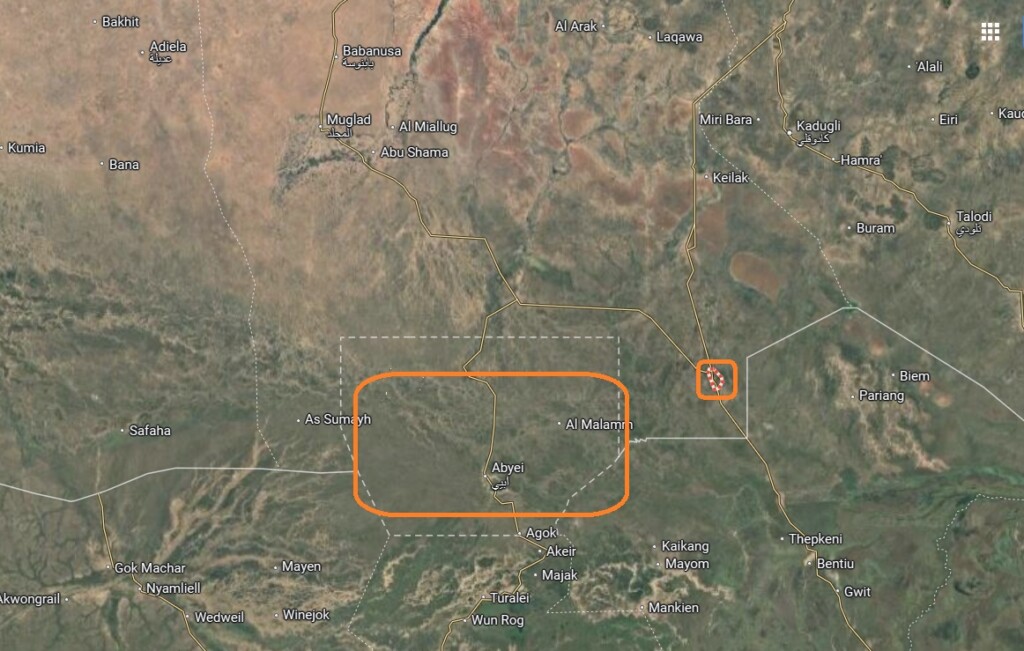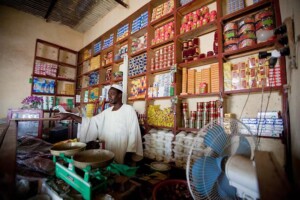El Burhan visits South Sudan ‘to discuss four critical files’

Abdelfattah El Burhan (L) meets with South Sudanese President Salva Kiir Mayardit in Juba, the capital of South Sudan, September 16 (Photo: SouthSudanGov via X)
Lt Gen Abdelfattah El Burhan, president of Sudan’s Sovereignty Council and commander-in-chief of the Sudanese Armed Forces (SAF), arrived in Juba, capital of South Sudan, yesterday, to discuss “critical issues regarding the relations between the two countries”.
It is El Burhan’s third official visit to South Sudan since the outbreak of the war between the SAF and the Rapid Support Forces (RSF) in mid-April last year. The general was received at Juba International Airport by South Sudan President Salva Kiir Mayardit and members of the Sudanese diplomatic mission to in Juba.
El Burhan was accompanied by the Minister of Energy and Oil, Mohyieddin Naeem, the undersecretary of the Ministry of Foreign Affairs, Ambassador Hussein El Amin, and the director general of the General Intelligence Service (GIS), Lt Gen Ahmed Mufaddal.
According to South Sudanese writer and journalist, Ateem Simon, El Burhan’s visit to Juba came “unannounced”.
The talks between Sudan and South Sudan covered four issues regarding the relations between the two countries, he told Radio Dabanga yesterday.
Military escalations
“The visit coincides with military escalations between the SAF and RSF in areas adjacent to the Sudan-South Sudanese border, especially in the areas of Babnis, Joda, and El Jabalein in southern White Nile state,” Simon said.
He added that the fighting includes the oil-rich Heglig (Hejlij) area – which, like neighbouring Abyei, is claimed by both Sudan and South Sudan but administered by Sudan.

Pipeline
Another problem concerns the pipeline transporting South Sudanese crude oil to the Bashayer Port in Red Sea state.
Since its secession from Sudan in 2011, landlocked South Sudan exports its oil, a vital source of its revenue, through the pipeline in Sudan, with the Sudanese government taking a cut as transit fees.
The transport of the crude oil has been halted, due to technical issues, since February, leading to major losses for both countries.
South Sudan, which relies on oil for over 90 percent of its government expenditures, has been losing $100 million per month, according to South Sudan’s former finance minister, Awow Daniel Chuang. Sudan is also suffering financially, with transit fee losses reportedly estimated at $24 per barrel for the 150,000 barrels of oil that were transported daily.
In October, a high-level delegation from South Sudan arrived in Port Sudan to discuss the resumption of the oil exports after the pipeline had been repaired.
Simon commented yesterday that the deadline set for resuming the oil exports has passed, “which suggests that there are security problems hindering the resumption of pumping South Sudan’s crude oil through the pipeline”.
‘No government in Sudan’
El Burhan’s visit also coincides with statements made by Taban Deng Gai, one of the four vice presidents of South Sudan, last week, about Sudan lacking a government.
Speaking about the status of Abyei, an oil-rich area contested by both Sudan and South Sudan, Deng Gai criticised his government’s lack of leadership and meaningful attention to the issue, Sudan War Monitor reported today. The matter is now more urgent, he said, because of deteriorating economic and humanitarian conditions in the area.
The Presidency of the Government of South Sudan responded to Deng Gai’s statement by saying that they express the opinion of the vice president and not the opinion of the South Sudanese government.
Simon commented that he expects that El Burhan would officially protest these statement.
El Burhan came to power through a joint SAF-RSF coup d’état against the civilian-led transitional government in October 2021. Following the outbreak of the armed conflict with the RSF more than 19 months ago, the SAF and civilian allies -many of them being affiliates of the ousted Al Bashir regime- are ruling the country from Port Sudan.
Peace agreement
The South Sudanese journalist further told Radio Dabanga that El Burhan, as president of the Sovereignty Council, is the guarantor of the “revitalised South Sudan Peace Agreement” under which the current transitional government in Juba was formed.
“Although the agreement was signed in 2018 during the rule of Omar Al Bashir, El Burhan has become the de facto guarantor, given that Sudan is the guarantor of the implementation of the agreement,” Simon said.
He linked El Burhan’s visit to Juba to disagreements within one of the groups that signed the agreement, the South Sudan Opposition Alliance (SSOA), which decided to remove its member, Hussein Abdelbagi, as vice president.
“Changing the group’s candidate requires consultation with Sudan and other parties. A similar disagreement erupted in 2020 and was resolved with the attendance of El Burhan and the approval of Abdelbagi for the position of vice president,” he explained.











 and then
and then